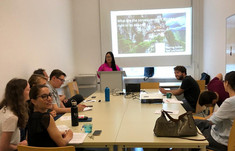To provide context, Tshering Dolkar first explained basic facts about Bhutan and how nature is valued by the Bhutanese people. On this basis, she elaborated on examples where legal personhood was granted to a natural object or to nature as a whole. A comparison of cases from New Zealand, India, Bolivia, Ecuador and the US revealed that there are many different reasons for granting legal personhood to rivers and mountains or nature as a whole, including spiritual motives, the protection of minority rights and the need for better protection of the environment.
Turning to Bhutan again, Tshering Dolkar focused on the Bhutanese river Puna Tshang Chu as a case study to illustrate what the advantages and disadvantages of treating a Bhutanese river as a legal person might have. A peculiarity of Bhutanese Law in this regard is that, according to Article 5(1) of the constitution of the Kingdom of Bhutan, “every Bhutanese is a trustee of the Kingdom’s natural resources and environment”. This tapestry of new perspectives on the protection of nature prompted a fruitful discussion about the fundamental principles of environmental law and the particularisation of rights in recent years.
You can find further information about Tshering Dolkar and her research here on our website and on the JSW Law School's website.

